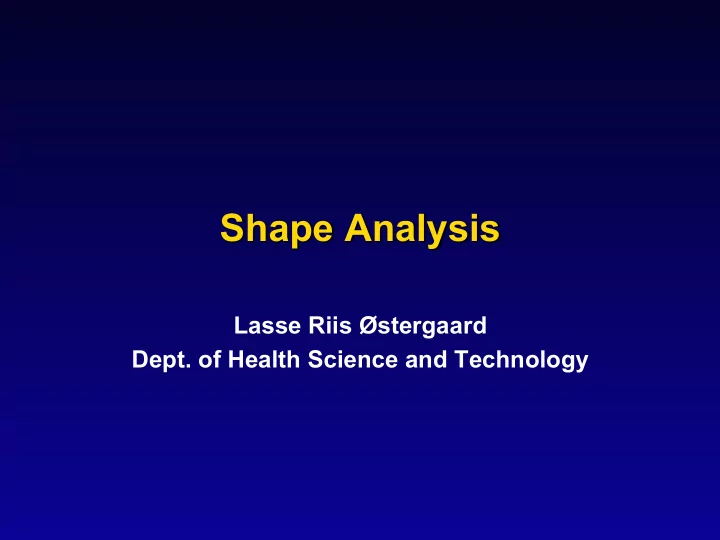

Shape Analysis Lasse Riis Østergaard Dept. of Health Science and Technology
Shape Analysis • Active contour models - snakes – Theory – Applications • Active shape models – Theory – Applications
Active Contour Example
Active Contours • Representation – How the contour appears – Geometry • Energy function – A function determining the behavior of the contour – Physics • Energy minimization – The scheme to minimize the energy function – Approximation theory
Representation • 2D representation: a line – r(s) =x(s),y(s) • 3D representation – Various extensions of 2D, e.g. plane, closed surface (sphere), generalized cylinder
Energy Function 1 E E (s) E (s) ds − ∫ snake internal external = 0
Internal Energy E E (s) E ( s ) + internal tension rigidity =
Tension 2 2 dr ( s ) dx ( s ) dy ( s ) ⎛ ⎞ ⎛ ⎞ E (s) = = + ⎜ ⎟ ⎜ ⎟ tension ds ds ds ⎝ ⎠ ⎝ ⎠ • I.E, the square of how much the snake is stretched at a given point
Rigidity 2 2 2 2 2 dr ( s ) d x ( s ) d y ( s ) ⎛ ⎞ ⎛ ⎞ E (s) ⎜ ⎟ ⎜ ⎟ = = + rigidity ⎜ ⎟ ⎜ ⎟ 2 2 2 ds ds ds ⎝ ⎠ ⎝ ⎠ • I.E, the square of how much the snake is bent at a given point
Behavior of Rigidity
External energy E (s) F ( x ( s ), y ( s )) I ( x ( s ), y ( s )) = ± line = y I Lines x x 2 E (s) F ( x ( s ), y ( s )) x ( s ), y ( s ) = ∇ Ι ( ) edge = y I Edges x x
Energy Minimization • Finite Differences Method (FDM) • Finite Element Method (FEM) • Dynamic programming • Greedy • B-snakes
Greedy • The search space ( m ) for each control node is searched. Complexity O (Nm) • Fast greedy • Complexity O (N ½ m) • Takes more iterations to converge
Dynamic Programming • Treat the the minimization process as a path planning problem. • Values from combinations are stored in a matrix. The matrix is backtraced • Complexity O (Nm^3)
Method Overview 3D data Vessel centre-line Vessel surface Diameter quantification 15
Centre-Line Extraction - MRA Largest connected components Topology preserving thinning Vessel enhancement filtering Fuzzy c-means clustering Original MRA scan 3D vessel centre-line 16
Surface Deformation • Parametric deformable model (discrete model) • Circular homogenous generalized cylinder • Energy function • E_total = E_int + E_ext • Non-uniformly expanding cylinder • Iterative global optimization (Dynamic Programming) • Surface reparameterization • Avoid twisting (inflection points – curvature changes sign) • Centre-line segments are processed individually • End points are fixated to preserve connectivity 17
Surface Deformation – energy terms • Internal energy • Tension (elasticity) - uniform distribution of centre-line points • Rigidity - smoothness of centre-line • Radius – smooth variation of the radius • Expansion – expanding behaviour • Constant weight parameters for all internal energy terms • External energy • Edge – attracts circular contour towards vessel wall (image gradients) • Weight parameter estimated based on a ”force balancing” strategy • E_total = α · L(V_i) • E_total = E_tension + E_rigidity + E_radius + E_expansion + E_edge 18
Surface Deformation – iterative approach 19
Method Overview Inner surface Outer surface MRI Data Initial surface Max Min FACE Measurements • Fast Accurate Cortex Extraction 20
Cortical reconstruction – method Initial Surface Cerebrum WM segmentation Filling of ventricles and subcortex Hemisphere separation T Surface tessellation opology correction Native scan Registration and intensity correction Brain extraction WM classification DEPARTMENT OF HEALTH SCIENCE AND TECHNOLOGY 21
Cortical reconstruction – method Outer Surface Deformation Every 5th iteration DEPARTMENT OF HEALTH SCIENCE AND TECHNOLOGY 22
DEPARTMENT OF HEALTH SCIENCE AND TECHNOLOGY 23
Cortical reconstruction – evaluation Qualitative Evaluations – intersections with images DEPARTMENT OF HEALTH SCIENCE AND TECHNOLOGY 24
Recommend
More recommend